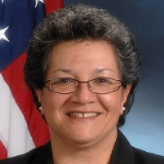The US Department of Housing and Urban Development (HUD) has had a long history of scandal and controversy. During the 1980s, HUD became embroiled in accusations of playing favorites with developers and housing officials who had political connections with the Reagan administration. One example involved a housing project in Durham, North Carolina, that was given the go-ahead even though some HUD staffers had found hazardous waste near the site. The mayor of Durham at that time was a friend of HUD secretary, Samuel Pierce, who was called before Congress to testify in regards to the many claims of improper dealings by his department. Pierce refused to testify by citing the Fifth Amendment right to not incriminate himself.
A Republican HUD scandal for a new generation
(by Steve Benen, Carpetbagger Report)
The Office of Community Planning and Development (CPD), located within the Department of Housing and Urban Development (HUD), administers a variety of grant programs to help low-income communities finance growth and development. CPD also provides assistance with shelters and services to aid homeless populations. CPD is composed of seven offices that target specific areas of development and community planning:
The Office of Community Planning & Development provides financial information on the distribution of its grants to states, cities and counties throughout the United States. Cumulative dollar totals are made available on five different types of grants: Community Development Block Grants (CDBG); HOME Investment Partnerships (HOME); American Dream Downpayment Initiative (ADDI); Housing Opportunities for Persons with AIDS (HOPWA); and Emergency Shelter Grants (ESG).
- FY 2008 Formula Allocations by State
- FY 2007 Formula Allocations by State
- FY 2006 Formula Allocations by State
- FY 2005 Formula Allocations by State
- FY 2004 Formula Allocations by State
- FY 2003 Formula Allocations by State
- FY 2002 Allocations by State (CDBG Only)
- FY 2001 Allocations by State
Some of the largest recipients among cities of CPD grants are: New York ($357 million); Los Angeles ($125 million); Chicago ($121 million); Philadelphia ($75 million); Houston ($49 million); Detroit ($48 million); Baltimore ($39 million); San Francisco ($38 million); and Cleveland ($32 million).
CPD Director in Thick of SF Housing Scandal
Fired official accuses HUD of coverup
(by Lance Williams, San Francisco Chronicle)
Pamela Hughes Patenaude (April 2005 to June 2007)
Pamela Hughes Patenaude Named Executive Director of ULI Terwilliger Center for Workforce Housing
- Table of Contents
- Overview
- History
- What it Does
- Where Does the Money Go
- Controversies
- Suggested Reforms
- Comments
- Leave a comment


Harriet Tregoning was named principal deputy assistant secretary for the Office of Community Planning and Development (CPD), an agency within the Department of Housing and Urban Development (HUD), on April 13, 2015.
Tregoning was born in 1960 in Chicago, Illinois, to Arthur and Sumako Hiken. Her father, who was a U.S. sailor serving in occupied Japan when he met her mother, died when Tregoning was only two years old. Her mother moved young Harriet, along with younger brother Alan, to St. Louis, Missouri. Living three blocks from a public library—where Harriet “all but lived”—turned her into a voracious reader. Proficient in math as well, she began taking classes at Washington University while still a senior in high school. In 1981, she earned her undergraduate degree in engineering and public policy, and soon was taking classes in law school, which is where she met banker Michael Tregoning, whom she married within a year.
Harriet’s first job out of school was with the Environmental Protection Agency (EPA), where her initial work was on Superfund Policy. Following her husband from California to Texas or wherever his work took him, Tregoning hopscotched from one EPA branch office to another, continuing her Superfund work on the move. After the couple separated in the early 1990s, she settled in Washington, D.C., to head the EPA’s waste-policy division. She stayed at the agency for 17 years, working her way up to the directorship of its Development, Community and Environment division.
In 1994, Tregoning’s participation in President Bill Clinton’s Council on Sustainable Development (CSD) inspired her to help assemble the Smart Growth Network, a collection of groups developing a movement devoted to community assistance and improvement. Tregoning went on to chair the CSD and helped found the advocacy organization, Smart Growth America, in 2000.
Tregoning’s departure from EPA soon led to her arrival at the doorstep of Maryland state government, where she worked with Governor Parris Glendening as his secretary of planning, and as director of the Governors' Institute on Community Design. After Glendening left office, she joined him in co-founding the Smart Growth Leadership Institute, for which she served as executive director.
In 2007, Tergoning headed to Washington, D.C., where she worked for seven years as director of the District of Columbia Office of Planning. In that post, she devoted herself to revitalizing the city, which included a passionate focus on making it more bike- and pedestrian-friendly. Not all residents cared for her efforts, with many finding her goals threatening to the status quo. “The thing people sometimes forget about Harriet is, she's viewed as a hero in the smart-growth movement, but a lot of D.C. residents really didn't like her,” The Washington Post’s then-land-use reporter told The Atlantic in 2015. Tergoning’s role in the rewriting of the city’s zoning code—for the first time in 50 years—was allegedly viewed by some as arrogant and high-handed. The Washingtonian described her as “a street fighter who often finds herself between warring forces.”
In February 2014, Tergoning left her D.C. planning job to join the Obama Administration’s Department of Housing and Urban Development, where she took charge of its Office of Economic Resilience (OER). Her appointment as director of the agency came in conjunction with launch of OER as a rebranding of HUD’s Office of Sustainable Housing and Communities. At OER, Tergoning helped launch the National Disaster Resilience Competition, a $1-billion program that invited applicants to propose recovery projects in order to qualify for disaster-relief funds.
As chief of CPD, Tergoning manages an annual budget of roughly $6 billion and oversees more than 40 field offices across the nation. She has said that her main focus in the job is to tackle homelessness in the U.S.
Tergoning adapts her vision for the nation’s cities to her own life, frequently traveling on her foldable bike, all the while awaiting the day when someone finally invents a folding bike helmet.
She is married to Geoffrey Anderson, president and CEO of Smart Growth America. The couple produces Bee-Land Honey, generated from the bees they keep at Anderson’s childhood home in D.C.’s Brookland.
-Danny Biederman
To Learn More:
What Harriet Tregoning Meant to Washington (by Jonathan O'Connell, Washington Post)
Meet Obama’s Chief Resilience Officer (by Laurie Mazur, Grist)

Mercedes Márquez has served as assistant secretary for community planning and development in the Department of Housing and Urban Development (HUD) since June 2009. The Office of Community Planning and Development is responsible for distributing grants to help low-income communities finance growth and development and to alleviate homelessness.
- Latest News
- D.C. Public Schools will Teach all Second-Graders to Ride a Bike
- New Rule in Germany Limits Sales of Sex-Themed E-Books to 10pm to 6am
- What Happened to the 6-Year-Old Tibetan Boy the Chinese Government Kidnapped 20 Years Ago?
- U.S. Ambassador to Turkey Photoshops his Hair Color to Mock Turkish Mayor
- Mystery Artist Calls Attention to Unfixed Potholes by Drawing Penises around Them
The US Department of Housing and Urban Development (HUD) has had a long history of scandal and controversy. During the 1980s, HUD became embroiled in accusations of playing favorites with developers and housing officials who had political connections with the Reagan administration. One example involved a housing project in Durham, North Carolina, that was given the go-ahead even though some HUD staffers had found hazardous waste near the site. The mayor of Durham at that time was a friend of HUD secretary, Samuel Pierce, who was called before Congress to testify in regards to the many claims of improper dealings by his department. Pierce refused to testify by citing the Fifth Amendment right to not incriminate himself.
A Republican HUD scandal for a new generation
(by Steve Benen, Carpetbagger Report)
The Office of Community Planning and Development (CPD), located within the Department of Housing and Urban Development (HUD), administers a variety of grant programs to help low-income communities finance growth and development. CPD also provides assistance with shelters and services to aid homeless populations. CPD is composed of seven offices that target specific areas of development and community planning:
The Office of Community Planning & Development provides financial information on the distribution of its grants to states, cities and counties throughout the United States. Cumulative dollar totals are made available on five different types of grants: Community Development Block Grants (CDBG); HOME Investment Partnerships (HOME); American Dream Downpayment Initiative (ADDI); Housing Opportunities for Persons with AIDS (HOPWA); and Emergency Shelter Grants (ESG).
- FY 2008 Formula Allocations by State
- FY 2007 Formula Allocations by State
- FY 2006 Formula Allocations by State
- FY 2005 Formula Allocations by State
- FY 2004 Formula Allocations by State
- FY 2003 Formula Allocations by State
- FY 2002 Allocations by State (CDBG Only)
- FY 2001 Allocations by State
Some of the largest recipients among cities of CPD grants are: New York ($357 million); Los Angeles ($125 million); Chicago ($121 million); Philadelphia ($75 million); Houston ($49 million); Detroit ($48 million); Baltimore ($39 million); San Francisco ($38 million); and Cleveland ($32 million).
CPD Director in Thick of SF Housing Scandal
Fired official accuses HUD of coverup
(by Lance Williams, San Francisco Chronicle)
Pamela Hughes Patenaude (April 2005 to June 2007)
Pamela Hughes Patenaude Named Executive Director of ULI Terwilliger Center for Workforce Housing
Comments
moreless

Harriet Tregoning was named principal deputy assistant secretary for the Office of Community Planning and Development (CPD), an agency within the Department of Housing and Urban Development (HUD), on April 13, 2015.
Tregoning was born in 1960 in Chicago, Illinois, to Arthur and Sumako Hiken. Her father, who was a U.S. sailor serving in occupied Japan when he met her mother, died when Tregoning was only two years old. Her mother moved young Harriet, along with younger brother Alan, to St. Louis, Missouri. Living three blocks from a public library—where Harriet “all but lived”—turned her into a voracious reader. Proficient in math as well, she began taking classes at Washington University while still a senior in high school. In 1981, she earned her undergraduate degree in engineering and public policy, and soon was taking classes in law school, which is where she met banker Michael Tregoning, whom she married within a year.
Harriet’s first job out of school was with the Environmental Protection Agency (EPA), where her initial work was on Superfund Policy. Following her husband from California to Texas or wherever his work took him, Tregoning hopscotched from one EPA branch office to another, continuing her Superfund work on the move. After the couple separated in the early 1990s, she settled in Washington, D.C., to head the EPA’s waste-policy division. She stayed at the agency for 17 years, working her way up to the directorship of its Development, Community and Environment division.
In 1994, Tregoning’s participation in President Bill Clinton’s Council on Sustainable Development (CSD) inspired her to help assemble the Smart Growth Network, a collection of groups developing a movement devoted to community assistance and improvement. Tregoning went on to chair the CSD and helped found the advocacy organization, Smart Growth America, in 2000.
Tregoning’s departure from EPA soon led to her arrival at the doorstep of Maryland state government, where she worked with Governor Parris Glendening as his secretary of planning, and as director of the Governors' Institute on Community Design. After Glendening left office, she joined him in co-founding the Smart Growth Leadership Institute, for which she served as executive director.
In 2007, Tergoning headed to Washington, D.C., where she worked for seven years as director of the District of Columbia Office of Planning. In that post, she devoted herself to revitalizing the city, which included a passionate focus on making it more bike- and pedestrian-friendly. Not all residents cared for her efforts, with many finding her goals threatening to the status quo. “The thing people sometimes forget about Harriet is, she's viewed as a hero in the smart-growth movement, but a lot of D.C. residents really didn't like her,” The Washington Post’s then-land-use reporter told The Atlantic in 2015. Tergoning’s role in the rewriting of the city’s zoning code—for the first time in 50 years—was allegedly viewed by some as arrogant and high-handed. The Washingtonian described her as “a street fighter who often finds herself between warring forces.”
In February 2014, Tergoning left her D.C. planning job to join the Obama Administration’s Department of Housing and Urban Development, where she took charge of its Office of Economic Resilience (OER). Her appointment as director of the agency came in conjunction with launch of OER as a rebranding of HUD’s Office of Sustainable Housing and Communities. At OER, Tergoning helped launch the National Disaster Resilience Competition, a $1-billion program that invited applicants to propose recovery projects in order to qualify for disaster-relief funds.
As chief of CPD, Tergoning manages an annual budget of roughly $6 billion and oversees more than 40 field offices across the nation. She has said that her main focus in the job is to tackle homelessness in the U.S.
Tergoning adapts her vision for the nation’s cities to her own life, frequently traveling on her foldable bike, all the while awaiting the day when someone finally invents a folding bike helmet.
She is married to Geoffrey Anderson, president and CEO of Smart Growth America. The couple produces Bee-Land Honey, generated from the bees they keep at Anderson’s childhood home in D.C.’s Brookland.
-Danny Biederman
To Learn More:
What Harriet Tregoning Meant to Washington (by Jonathan O'Connell, Washington Post)
Meet Obama’s Chief Resilience Officer (by Laurie Mazur, Grist)

Mercedes Márquez has served as assistant secretary for community planning and development in the Department of Housing and Urban Development (HUD) since June 2009. The Office of Community Planning and Development is responsible for distributing grants to help low-income communities finance growth and development and to alleviate homelessness.
- Latest News
- D.C. Public Schools will Teach all Second-Graders to Ride a Bike
- New Rule in Germany Limits Sales of Sex-Themed E-Books to 10pm to 6am
- What Happened to the 6-Year-Old Tibetan Boy the Chinese Government Kidnapped 20 Years Ago?
- U.S. Ambassador to Turkey Photoshops his Hair Color to Mock Turkish Mayor
- Mystery Artist Calls Attention to Unfixed Potholes by Drawing Penises around Them




Comments
moreless